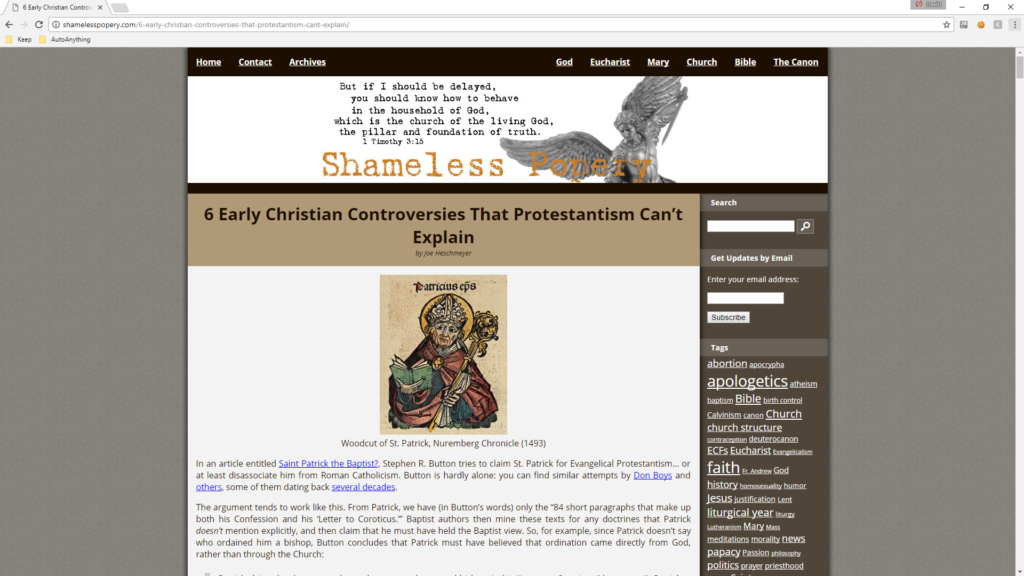Early Christian Controversies that Protestantism Can’t Explain
This past Friday, Joe Heschmeyer was on Catholic Answer Live, the audio of which is available here. Joe was talking about one of my favourite subjects, Church History. In particular he was talking about how many of the early controversies in the Church can’t really be explained from within a Protestant framework.
For example, in the Early Church there was a breakaway group in AD 311 called the Donatists. These were rigorists who insisted that the sacraments administered by clergy who had been compromised during persecution were invalid. This was a major issue within the Church of the Early Fourth Century…but it’s an argument that makes no sense within most Protestant frameworks.
If you are interested, the article where he draws out these ideas is available below:

Hi RP. I think this one is simple. The importance of the clergy grew as time passed. Cyprian was the first writer we know about to actually refer to elders as priests rather than comparing them to the role of priests as Clement of Rome did. Admittedly, even before Cyprian’s time leadership was required to “consecrate” the Eucharist, but neither the New Testament nor the Didache require a “consecration,” but a giving of thanks. Thus, my answer would be that a priest consecrating the Eucharist was not an apostolic tradition but a late-second to mid-third century development.
Hey Paul, it’s been a while!
I’d say that the role of the clergy certainly became more clarified and codified over time, but I would suggest its importance was always there.
As Clement of Rome is building his argument in his epistle, he uses many Old Testament examples to show that one should not rebel against divinely-appointed authorities. He then concludes his letter with the following:
“For our sin will not be small, if we eject from the episcopate those who have blamelessly and holily fulfilled its duties. Blessed are those presbyters who, having finished their course before now, have obtained a fruitful and perfect departure [from this world]; for they have no fear lest any one deprive them of the place now appointed them. But we see that you have removed some men of excellent behaviour from the ministry, which they fulfilled blamelessly and with honour.” – Clement of Rome (AD ~96)
There are many, many quotations from Ignatius concerning the importance and centrality of the clergy. Here is I think one of the most strident:
“Let no man do anything connected with the Church without the bishop. The celebration of the Eucharist is valid only if it is administered by the bishop or by one to whom he has entrusted it. Where the bishop is, there let the people also be; just as where Jesus Christ is, there is the Catholic Church. It is not permitted to baptize or to celebrate an agape without authorization from the bishop” – Ignatius of Antioch to the Smyrnaeans
You appear to draw a very strong distinction between “consecration” and “thanksgiving”. What distinction do you see here?
“Likewise, we have been taught that the food blessed by the prayer of his word…is the flesh and blood of Jesus who was made flesh” – Justin Marytr, First Apology
I had been under the impression from our previous conversations that you held the Ante-Nicene Fathers in higher regard than this, choosing the Edict of Milan as the point beyond which you regarded the Church as too compromised. Given what you’ve said, I imagine you’re explanation for nearly all these Early disputes is that the Church was already well off-track and therefore arguing about nonsensical issues.